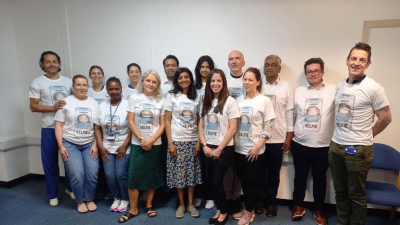Staff in the Royal Free London's (RFL)
Skin cancer is the fastest growing cancer globally with melanoma skin cancer rates in the UK increasing by almost a third in over the past decade. The RFL has the largest skin cancer service in London and it’s also the trust’s largest cancer service.
Early diagnosis is key and the North London Cancer Alliance recently awarded the trust £42,000 to look at how imaging supplied by patients, such as a photograph of a mole, could potentially be analysed by AI.
Mr Alan Ponniah, consultant plastic and reconstructive surgeon, said: “We are developing the technology and working to understand if this is something we could harness.”
Mr Ponniah has also been sponsored by UCLPartners to attend an innovator accelerator course to help him develop the project.
Recently another member of the team, Dima Alobaidi, a medical student, presented at the World Congress of Melanoma in Athens. Her poster presentation explored the effectiveness of prevention campaigns worldwide and the need for a skin cancer prevention strategy in the UK.
RFL staff have already come up with a possible animal character, a cute looking mole called ‘Spot’ to appeal to children, to help share the prevention message, given that avoiding sun exposure early on is especially critical in reducing the risk of developing skin cancer in later years.
Dr Ponniah said: “We’ve printed some ‘Spot’ T-shirts and have planned a series of engagement events where we can propose different ideas and see what messages resonate with people. We feel we need to be part of the solution.”
May is skin cancer awareness month.
 Translate
Translate